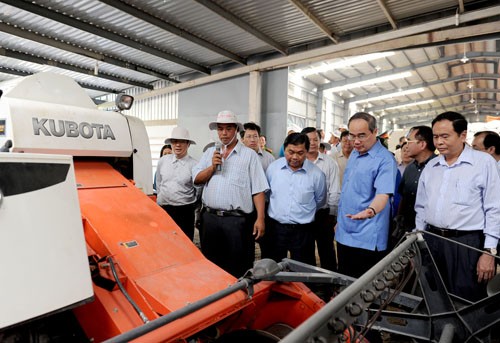Khiet Tam collective - a typical economic model in Can Tho
(VOVworld) – Can Tho City’s Farmers’ Association is supporting a number of agricultural collective models to help the local people escape poverty and contribute to the local implementation of a national new rural development program. Khiet Tam collective is one such model.
On Khiet Tam Collective’s vast fields growing fragrant rice coded Jasmine 85, a group of farmers and scientists are conducting research on ways to reduce adverse impacts on the environment. The head of the group, Nguyen Hoang Khai of the Mekong River Delta’s Development Research Institute, said rice is grown on these fields under the Global Good Agricultural Practice (GAP) Standards. GAP standards require farmers to apply the model of “1 Must- 5 Reductions”: using certified seeds while reducing seed rate, water, pesticide, fertilizer, and post-harvest losses. In addition to this model, Khai said his group is instructing local farmers apply measures to reduce green house gas emissions: "Local farmers are very enthusiastic about applying new scientific advances to cultivation and production and supporting our research activities. New methods we are introducing will help cut CH4 gas emissions and make rice grow stronger and easier to harvest."

Vietnam Fatherland Front Nguyen Thien Nhan visits Khiet Tam Collective in Can Tho City. Photo: Minh Hoa/VOV
|
Khiet Tam collective’s cooperation with scientists looking for more effective cultivation methods has become a consistent policy. Established in 2009 with initial 6 households, Khiet Tam Collective’s current 160 households now grow rice on 340 ha under the Global GAP standards. The Collective has signed contracts with Gentraco Company. Nguyen Ngoc Huan is in charge of the Collective’s cooperation activities: "The application of advanced technologies has improved our productivity and product quality. We often invite scientists and agricultural experts to show local farmers how to grow better crops. On average, we harvest 7.5 tons of rice in each winter-spring crop, and 5.5 tons of rice in each summer-autumn and autumn-winter crop."
Thanks to support from the local agricultural sector, local authorities, and the Can Tho municipal Farmers’ Association, Khiet Tam has benefited from preferential programs, policies, and projects in agricultural development. The success of collectives like Khiet Tam has helped local farmers escape poverty and contributed to national new rural development efforts. Tran Thi Thien Thu is deputy chairwoman of the Can Tho municipal Farmers’ Association: "Now that Vietnam has signed the TPP agreement and is further integrating into global markets, production alliances and cooperation are required to deal with fierce competition in product quality and price. The city’s Farmers’ Association has asked the local authorities to support the establishment and operation of at least 2 production collectives each year."